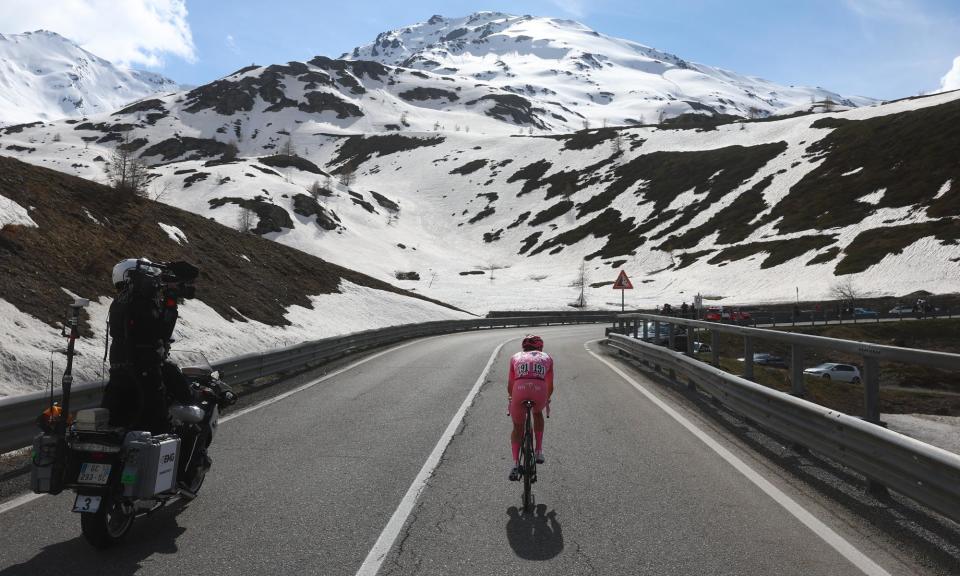Pogacar’s Giro d’Italia domination seals place among cycling’s greats

Since Tadej Pogacar’s stage win on day two at the Oropa sanctuary three weeks ago, the only suspense in this year’s Giro d’Italia centred on the Slovenian’s eventual winning margin, and which stage-winning records he would match along the way.
Three and a half kilometres from the summit of Monte Grappa, tackled twice on Saturday afternoon, it became clear: once again he had left the field trailing, his sixth stage win beckoned, along with a substantial increase in his overall winning margin, towards 10 minutes.
Related: Tadej Pogacar completes emphatic debut victory at the Giro d’Italia
By the finish in Bassano del Grappa, Pogacar had equalled the standard set for absolute domination in the Giro in the past half-century, Eddy Merckx’s 1973 win, with half a dozen stages along the way. Pogacar had matched Jacques Anquetil’s feat of 1960, wearing the pink leader’s jersey for 18 days.
In recent years, the Giro has often been decided by mere seconds as it has in minutes; Pogacar rode into Rome on Sunday nine minutes and 56 seconds clear of the Colombian Dani Martínez, the biggest winning margin in the Giro since 1965. He has pushed his total of wins for the year to 14, in 30 race days, a success rate approaching that of Merckx at his best.
One vignette sums up this Giro, at the Passo Brocon finish on Wednesday. Approaching the final kilometre, with the group of overall contenders closing on the lone breakaway Georg Steinhauser, Geraint Thomas’s Ineos teammates set a fierce pace to dislodge one of Thomas’s rivals for second place, the Australian Ben O’Connor. When Martinez accelerated, Pogacar responded almost apologetically and drifted off the front of the group seemingly without meaning to.
He did not need to go deep to open a gap; having taken the two previous mountain stages he had no particular need to win the stage. He was effectively controlling the race with his immediate rivals trailing a few hundred metres behind, all of them completely incapable of closing the gap.
This Giro reinforces an unsettling truth. Along with Remco Evenepoel, Mathieu van der Poel, Primoz Roglic and – assuming he recovers from his horrendous crash in April – Jonas Vingegaard, “Pogi” is one of a small group of stars who are light years ahead of the rest of the peloton. Unless another of the “fantastic five” is present, they can be expected to win whenever they pull on a race number. At times it is enthralling, on other occasions, such as this Giro, it is a matter of statistics and record books.
In Italy, Thomas performed surprisingly well for a 38-year-old who rode his first Tour de France when Pogacar was barely off riding a bike with stabilisers, Martínez has ridden his best Grand Tour, and the young Italian Antonio Tiberi has visibly progressed, but none of them has been anywhere near good enough to shake Pogacar for a single second.
The double world champion Julian Alaphilippe has returned to his best with a stage win and some epic escapes and Italy has discovered a new sprinter in Jonathan Milan, but in terms of making the mighty Slovenian tremble, they have barely been a distraction.
Until a few close encounters with over-enthusiastic tifosi on the climb on Saturday, Pogacar had endured one minor hiccup: stage two’s minor pratfall after attempting to take a bend on a flat front tyre. There is a sportswriters’ cliche about the greats making their sport look shockingly easy; this is where Pogacar has been for the past three weeks.
At times it was easy to forget Pogacar had not won a Grand Tour for almost three years. Since his defeat at the 2022 Tour de France he has been rampant in one-day Classics, building an all-round record unparalleled since Bernard Hinault in the early 1980s. However, his struggles in the past two Tours underline that, however seamless a rider’s domination in a Grand Tour may look, the adjective “easy” is never appropriate.
At their best, cycling’s non-pareils such as Merckx, Hinault and Miguel Induráin seemed to function in a dimension where time and space were their own compared to the mere mortals. Pogacar has entered that place and the question now is whether he can back it up at the Tour de France, something no one has done since the drug-fuelled super-climber Marco Pantani in 1998.
The Slovenian will find stiffer competition there with Roglic, Evenepoel and probably Vingegaard on the start line and will face the challenge of retaining his form – or something close to it – until late July. But after the last three seamless weeks, few would bet against it.

